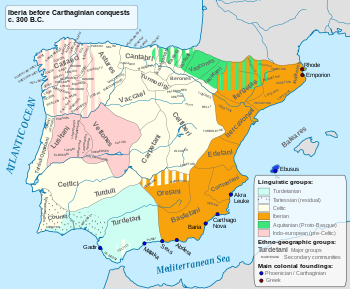Iacetani
This article has multiple issues. Please help improve it or discuss these issues on the talk page. (Learn how and when to remove these messages)
|

The Iacetani or Jacetani (Ancient Greek: Ιακκητανοι, romanized: Iakkētanoi, or Latin: iacetani) were a pre-Roman people who populated the area north of Aragon (Spain). They settled the Ebro valley, specifically in the area along the Pyrenees.[1] Its capital was Iaca (now Jaca). According to Strabo, their land stretched from the Pyrenees to Lleida and Huesca. It is believed that they could be related to the Aquitanes. They were known to stamp coins. They also appear in the texts of Pliny the Elder and Ptolemy.
Origins
[edit]Their affiliation with the Vascones is disputable, as they inhabited an area in the high Aragon river valley (today's northwestern corner of Aragon). Strabo mentions Iacetani in his Sertorius chronicles as people independent from the Vascones, although another Greek historian, Ptolemy identified them with the Vascones. According to some theories, they may have originated from the Aquitanians who crossed the Pyrenees and settled in the southern slopes of the mountains along with the Vascones (they could be related peoples or tribes with a common origin but not the same people).
These mountain people were bordered to the south by the Suessetani of the plains, who were often looted by the inhabitants of Iaca.
History
[edit]The Iacetani were defeated by the Romans in 195 BC when Cato the Elder took their capital with the support of the Suessetani, which distracted the Iacetanian army. Coins minted with the inscription "IACA" in northeastern Iberian script are coincident with their being mentioned by Strabo, dating between the 1st century BC and early in the 1st century AD.
Julius Caesar cited the Iacetani as one of the tribes that changed allegiances to him alongside the Ausetani and Illurgavones during his campaign extending the Roman frontier.[2] This event happened shortly after Decimus Brutus defeated Domitius' fleet in the war against the Veneti and increased Caesar's reputation among the natives prompting the Iacetani to begin sending envoys and even agreed to supply him with corn.[3]
Romanization
[edit]In 19 BC their territory was incorporated into the Roman Empire, in the aftermath of the Cantabrian Wars, as vassals of Rome. This meant that they did not enjoyed the full Roman citizenship status, and their situation was precarious when compared to other peoples of the region, such as the Sedetani.
References
[edit]- ^ Vicens Vives, Jaime (2015). Economic History of Spain. Princeton, NJ: Princeton University Press. p. 24. ISBN 9781400879564.
- ^ Evans, Richard (2015-08-31). Fields of Battle: Retracing Ancient Battlefields. South Yorkshire: Pen and Sword. p. 203. ISBN 9781848847965.
- ^ Fuller, J. F. C. (2018). Julius Caesar: Man, Soldier, and Tyrant. Pickle Partners Publishing. ISBN 9781789121315.
- VV. AA., Los Aragoneses, Madrid, Istmo (Fundamentos 57), 1977, pages 70–71. ISBN 84-7090-084-6.
Bibliography
[edit]- Ángel Montenegro et alii, Historia de España 2 - colonizaciones y formación de los pueblos prerromanos (1200-218 a.C), Editorial Gredos, Madrid (1989) ISBN 84-249-1386-8
External links
[edit]- Page on Iberian currency Archived 2005-03-10 at the Wayback Machine
- Encyclopedia of Aragon Archived 2010-01-05 at the Wayback Machine
- Great Encyclopedia Rialp on Iacetani
